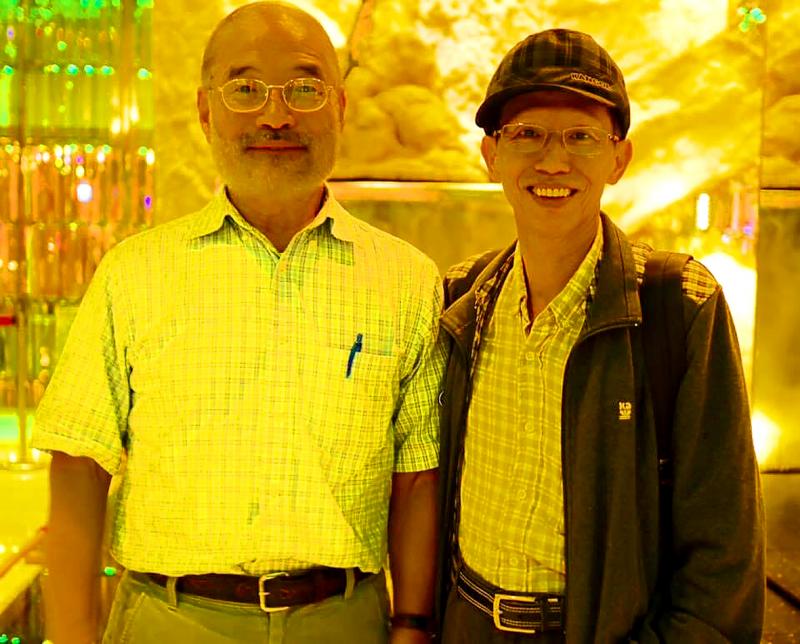Peter Tsai (蔡秉燚), the Taiwan-born inventor of the key technology used in N95 respirators and masks, is studying ways to sterilize masks for reuse amid a global shortage due to the COVID-19 pandemic.
Tsai, 68, said that he was motivated not by money, but by a desire to help others.
“Given the choice, I would prefer to help 100 million people rather than earn US$100 million,” Tsai said on Wednesday.

Photo courtesy of National Taipei University of Technology alumni Huang Chun-chung
Tsai, who has retired from his work as a researcher at the University of Tennessee, wrote an article for the University of Tennessee Research Foundation in which he explored ways to sterilize and reuse masks.
After graduating from the Provincial Taipei Institute of Technology, now known as National Taipei University of Technology, Tsai worked at the Taiwan Textile Research Institute in then-Taipei County, before transferring to a dyeing and finishing plant.
At the time, textile equipment and technology were imported from the US, Europe and Japan, Tsai said.
Spurred by his interest in the industry, he moved to the US to attend graduate school.
At Kansas State University he threw himself wholeheartedly into his studies, completing more than 500 credits — the equivalent of six doctoral degrees of course material, he said.
Tsai’s coursework and research touched upon a variety of disciplines, including hydrodynamics, electrical engineering and material science, and in his experiments he used computers to rapidly model theoretical results.
After graduation, he became a research fellow at the University of Tennessee and in 1992 led a research team that developed two key technologies that would be used in respirators.
Tsai’s research in melt blowing and electrostatic charging technologies greatly improved the filtration efficiency of nonwoven fabrics used in masks, allowing submicron particles to be captured and stopped from traveling through the masks, the Nonwoven Fabrics Industry Association said on Facebook on April 6.
After seeing the pandemic worsen and the global mask shortage, Tsai wrote a research paper on ways to extend the life of disposable masks.
The paper has garnered the attention of researchers at several US schools, including the Massachusetts Institute of Technology, Harvard University, Yale University and Stanford University.
“They told me I could earn a lot from these findings, but I would rather help people than make money,” Tsai said.

Chinese spouse and influencer Guan Guan’s (關關) residency permit has been revoked for repeatedly posting pro-China videos that threaten national security, the National Immigration Agency confirmed today. Guan Guan has said many controversial statements in her videos posted to Douyin (抖音), including “the red flag will soon be painted all over Taiwan” and “Taiwan is an inseparable part of China,” and expressing hope for expedited reunification. The agency last year received multiple reports alleging that Guan Guan had advocated for armed reunification. After verifying the reports, the agency last month issued a notice requiring her to appear and explain her actions. Guan

The Kaohsiung Tourism Bureau audited six hotels in an effort to prevent price gouging ahead of Korean band BTS’ concert tour in the city scheduled for Nov. 19, 21 and 22 this year. The bureau on Friday said that the audits — conducted in response to allegations of unfair pricing posted on social media — found no wrongdoing. These establishments included the local branches of Chateau de Chine, Hotel Nikko, My Humble House, and Grand Hai Lai, it said, adding that the Consumer Protection Commission would have penalized price gougers had the accusations been substantiated. The bureau said the Tourism Development Act

BACK TO WINTER: A strong continental cold air mass would move south on Tuesday next week, bringing colder temperatures to northern and central Taiwan A tropical depression east of the Philippines could soon be upgraded to be the first tropical storm of this year, the Central Weather Administration (CWA) said yesterday, adding that the next cold air mass is forecast to arrive on Monday next week. CWA forecaster Cheng Jie-ren (鄭傑仁) said the first tropical depression of this year is over waters east of the Philippines, about 1,867km southeast of Oluanpi (鵝鑾鼻), and could strengthen into Tropical Storm Nokaen by early today. The system is moving slowly from northwest to north, and is expected to remain east of the Philippines with little chance of affecting Taiwan,

GIVE AND TAKE: Blood demand continues to rise each year, while fewer young donors are available due to the nation’s falling birthrate, a doctor said Blood donors can redeem points earned from donations to obtain limited edition Formosan black bear travel mugs, the Kaohsiung Blood Center said yesterday, as it announced a goal of stocking 20,000 units of blood prior to the Lunar New Year. The last month of the lunar year is National Blood Donation Month, when local centers seek to stockpile blood for use during the Lunar New Year holiday. The blood demand in southern Taiwan — including Tainan and Kaohsiung, as well as Chiayi, Pingtung, Penghu and Taitung counties — is about 2,000 units per day, the center said. The donation campaign aims to boost